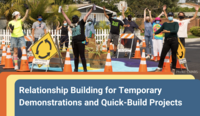This spring, UC Berkeley SafeTREC, in collaboration with California Walks, rolled out a new resource for former Community Pedestrian and Bicycle Safety Training program participants. Funded by the California Office of Traffic Safety (OTS), we convened residents, agency staff, and other transportation safety advocates for a three-part virtual peer exchange, Strengthening Partnerships: A 2022 Peer Exchange Series for former CPBST sites. Over one and a half months, participants networked and discussed their experiences with active transportation safety related to crowdsourced data strategies, infrastructure improvements and working in unincorporated communities.
Using Crowdsourced Data Strategies in Community Engagement
Crowdsourced data collection tools like Photo Voice, Video Voice, and Street Story, can help promote effective community engagement. In this session, SafeTREC’s Jarah Crowner provided an overview of several crowdsourced data strategies and their benefits before facilitating a discussion with participants on their successes, challenges they’ve faced, and their lessons learned on the topic. See the peer exchange summary for more information.
Relationship Building for Temporary Demonstrations and Quick-Build Projects
Temporary demonstrations and quick-build projects are cost- and time-effective infrastructure improvements that can substantially improve the safety of all road users in a community. In this session, SafeTREC’s Kristen Leckie provided an overview and highlighted the need to build relationships with decision makers in order to successfully win temporary demonstrations and quick-build projects. Participants shared local examples of infrastructure improvements in their communities, challenges they’ve encountered, and resources that have facilitated this work. For more information, see the peer exchange summary
Active Transportation Planning in Unincorporated Communities
Unincorporated communities do not have their own municipal government, which leads many to have agreements with their counties or neighboring communities in order to provide necessary services. Because of this, unincorporated communities face a set of unique challenges and complexities when it comes to active transportation planning and safety improvements. Participants bonded over their shared challenges and the approaches they’ve taken to overcome them. In this session, SafeTREC’s Garrett Fortin also provided insight into several strategies and opportunities for unincorporated communities. See the peer exchange summary for more information.
What other topics would you like to see?
We hope to conduct another round of peer exchanges next year and we would love to feature topics submitted by CPBST participants. You can send topics you’d like to see discussed to cpbst@berkeley.edu
About the CPBST
The Community Pedestrian and Bicycle Safety Training Program (CPBST) is a joint project of UC Berkeley SafeTREC and California Walks. The CPBST program works with local residents and health, transportation and safety advocates to understand a community’s walking and biking safety concerns and advance their pedestrian and bicycle safety goals. We work to strengthen collaboration between all safety partners, discuss transportation safety information and local crash data, and collectively develop a community-driven safety action plan. Our team works with a local Planning Committee to customize the workshop to fit the unique needs of each community.
The CPBST peer exchanges are supported by funding from the California Office of Traffic Safety, through the National Highway Traffic Safety Administration.
